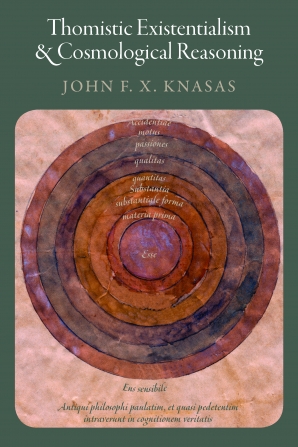- Home
- philosophy
- Thomistic Existentialism and Cosmological Reasoning
Preparing your PDF for download...
There was a problem with your download, please contact the server administrator.
Thomistic Existentialism and Cosmological Reasoning
Imprint: Catholic University of America Press
Cosmological reasoning is an important facet of classical arguments for the existence of God, but these arguments have been subject to may criticisms. The thesis of this book is that Thomas Aquinas can dodge many of the classic objections brought against cosmological reasoning. These objections criticize cosmological reasoning for its use of the Principle of Sufficient Reason; its notion of existence as a predicate; its use of ontological reasoning; its reliance on sense realism; its ignoring of the problem of evil; and its susceptibility to the critique of "ontotheology" as famously put forward by Heidegger. All of these objections receive a reply, showing that Aquinas’s De Ente et Essentia reasoning for God as esse tantum employs a more nuanced understanding of a thing’s existence than is found in Leibniz’s classic cosmological arguments.
Secondly, the book proposes that the kind of reasoning found in Aquinas's De Ente can be formulated in a more robust version. Prompted by Aquinas’s admissions that philosophical knowledge of God is the prerogative of metaphysics, the second main portion of the book extensively illustrates how the more robust version of the De Ente is the interpretive key for Aquinas’s many arguments for God. Hence, the book should be of interest both to philosophers engaged in cosmological reasoning discussion and to Thomists interested in understanding Aquinas’s viae to God.
Finally, the deep purpose of the book is to reawaken interest in Thomistic Existentialism, an interpretation of Aquinas that flourished in the 1950's in the works of Etienne Gilson, Jacques Maritain, and Joseph Owens. In this interpretation, a particular thing’s existence is the actuality of the thing in the sense of a distinctive actus not translatable into something else, for example, the fact of the thing or the thing having form. This book clearly explains how this interpretation looks at Thomas's metaphysics, and why it helps illuminate metaphysical realities.
John F.X. Knasas is professor of philosophy at the Center for Thomistic Studies, University of St. Thomas, Houston, TX, as well as the author of Aquinas and the Cry of Rachel: Thomistic Reflections on the Problem of Evil (CUA Press).
"Provides a broad defense of existential Thomism, while at the same time showing its fruits for natural theology and the interpretation of Aquinas's writings. Knasas writes like an academic pro. His style is clear, even when dealing with highly technical subjects. And his voice is appropriately formal, while remaining engaging."
~James D. Madden, author of Mind, Matter, and Nature: A Thomistic Proposal for the Philosophy of Mind
"The Existential Thomism of Gilson and Maritain lives on in Knasas's erudite account of the arguments for the existence of God. Knasas provides a comprehensive overview of the contemporary debates surrounding the proofs for God while taking on all challengers."
~Christopher Cullen, SJ, Fordham University
"It has long been apparent that Professor Knasas is one of the most important philosophers working today. This book puts a seal on this judgment. An immensely creative and constructive defense of existential Thomism and the Thomistic proofs of God's existence, passing through Leibniz, Kant, Heidegger, analytic Thomists of various stripes, and a wide swath of Aquinas's corpus. Knasas is a philosopher for anyone who cares about the 'big issues.'"
~Matthew Levering, James N. and Mary D. Perry Jr. Chair of Theology, Mundelein Seminary
"In the mid-twentieth century, there appeared an approach to Thomistic metaphysics called ‘existential Thomism,’ focusing on the esse of things, and on the intellect’s grasp of esse in its judgments. Among the notable existential Thomists were Etienne Gilson and Gilson’s student Joseph Owens. The present book, by Owens’s student, John Knasas, performs the important service of showing the continuing vitality of existential Thomism and its relevance to current discussion of the so-called cosmological argument."
~Kevin White, The Catholic University of America
"A profound expression of an imaginative hermeneutic, and a testament to the vitality of Thomistic scholars contending with each other in response to the challenges of modern philosophy."
~Thomist
"In most of academia, as the saying goes, the fights are so vicious because the stakes are so small. I am convinced that the opposite is true in the realm of Thomism, and Knasas bears this out. The fights are so pleasant because the stakes are incomparably great."
~Journal of Interdisciplinary Studies
"Knasas’ book is of great value to contemporary philosophical discourse, not only for what it accomplishes, to wit, advance in, and defense of, Existential Thomism in application to natural theology, but also for what it prompts to be accomplished by further venture in Existential Thomism."
~Reviews in Religion and Theology


